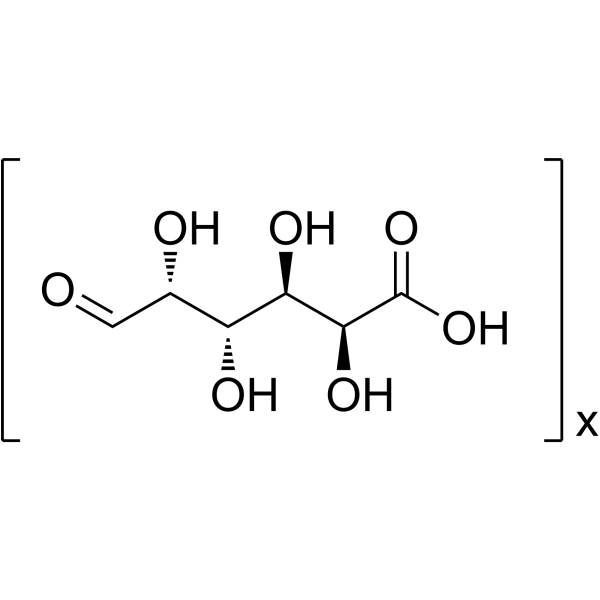25990-10-7
| Name | D-Galacturonic acid |
|---|---|
| Synonyms |
DL-Galacturonic acid
α-D-Galacturonic acid MFCD00131972 D-Galacturonic acid (9CI) D-Galacturonic acid δ-Galacturonic acid |
| Description | Polygalacturonic acid (Galacturonic acid polymer) is transparent colloid, is a major component of the cell wall. Polygalacturonic acid can be used to prepare silver nanoparticles (AgNPs), as an antioxidant and anti-inflammatory that protect cells from destructive effect of elevated ROS and accelerate wound healing. Polygalacturonic acid nanoparticles also displays anti-bacterial activity[1][2]. |
|---|---|
| Related Catalog | |
| In Vitro | Polygalacturonic acid can be used to format a durable hydrogel, to prolong the effect of drugs. Polygalacturonic acid hydrogel/hyaluronate, conjugated Ibuprofen (HY-78131) for example, prevents epidural fibrosis, the severe scar tissue adhesion of laminectomized male adult rats, and increases the efficiency of local inflammation control and reduces the side-effect of Ibuprofen[1]. Polygalacturonic acid hydrogel/hyaluronate (PGA-HA) (2%, 200 μL; 24 h) shows low cytotoxicity on L929 fibroblasts[1]. Polygalacturonic acid (PGA) preparing (Ag-PGA/HA)-PVA nanoparticles, shows anti-bacterial activity against gram-positive bacterial strains; Bacillus Subtilis and Staphylococcus Aureus, as well as gram-negative bacterial strain; Escherichia Coli[2]. |
| In Vivo | Polygalacturonic acid (external application; 14 d) enhances a quick healing of wound infection in albino rats[2]. Animal Model: Full thickness wound model in albino rats (60-day-old, 180 g)[2] Dosage: Ag-Polygalacturonic acid/hyaluronic acid nanoparticles Administration: Applied on dorsal muscle fascia; cleaned the wound daily with alcohol; for 14 days Result: Resulted no sign of abscess formation or hypertrophic scars both in the early phase; 5th day or in the final phase; 14th day, respectively. Showed significant wound healing from day 8 while treated with (Ag-PGA/HA)-PVA nanofiber and blank (PGA/HA)-PVA nanofiber and induced epithelization on day 14. |
| References |
| Density | 1.7±0.1 g/cm3 |
|---|---|
| Boiling Point | 553.4±50.0 °C at 760 mmHg |
| Molecular Formula | C6H10O7 |
| Molecular Weight | 194.139 |
| Flash Point | 302.6±26.6 °C |
| Exact Mass | 194.042648 |
| LogP | -1.49 |
| Vapour Pressure | 0.0±3.4 mmHg at 25°C |
| Index of Refraction | 1.592 |
| Personal Protective Equipment | Eyeshields;Gloves;type N95 (US);type P1 (EN143) respirator filter |
|---|---|
| Hazard Codes | Xi |
| RIDADR | NONH for all modes of transport |

